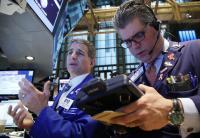Investing seems like a simple cyclical process: gathering information, making purchase decisions, selecting investments, holding and selling. But everything must happen at the right moments, and many investors seem confident in this. What is it that causes emotions to still obstruct rational considerations even among experienced investors? Are all investors overconfident crybabies?
The cyclical process of investing is fraught with psychological obstacles. Even the most experienced investor cannot escape these pitfalls. Whether it’s portfolio strategy, long-term policy, or whether it involves institutional or individual investors: biases and money scripts hinder wise decisions. Simply put, biases are generic, unconscious prejudices, and money scripts are universal unconscious personal beliefs about money. These biases and money scripts are stored in our brains like a blueprint, dictating and directing our financial (investment) behavior.
Emotionless & rational?
Our brains are naturally lazy and prefer to be in energy-saving mode. The original function of biases and money scripts is to make our lives easier. However, in daily financial decisions, and particularly in investment decisions, biases and money scripts seem more of an obstacle to making rational decisions.
What exactly qualifies as a rational decision? Is it deciding without any form of emotion, as some self-proclaimed experts claim? That’s simply impossible unless you’re a psychopath or have significant brain damage. Generally, we regard something as a non-rational decision if it is driven by emotion and turns out not to be so wise shortly thereafter.
Impulses and emotions
Investment decisions made on impulses are not due to an investor being too emotional but rather because different parts of the brain are not working in harmony.
Our primitive brain is responsible for impulses stemming from certain emotions or feelings we experience in a situation. These impulses vary in intensity depending on the impact of the situation. A bad night’s sleep and a flat tire have a different effect than a constantly changing or volatile financial market.
Overconfidence
Both institutional and individual investors often act counterproductively. One of the most common and top five causes of this counterproductive behavior in investment biases is overconfidence. Overconfident investors believe they have full control over investments when in reality they do not. Portfolio strategy and every individual investment decision are accompanied by mapping the complex consequences of certain choices.
Overconfident investors, often men, overestimate their capacity to identify successful portfolio strategies. These investors overestimate their abilities far more than an average person.
Moreover, research shows that overconfidence is an indication of active and excessive trading. Studies have found that investors who use traditional techniques such as telephone communication achieve better results than online traders. Online trading often happens speculatively and excessively. It has also been shown that active traders perform worse than the market.
Investors with emotions are courageous
Wise decision-making is different from making investment choices without emotions or impulses from the primitive brain. All sensible financial choices, and thus investment decisions, are made by a brain whose various parts work in harmony. This is achieved by recognizing the impulse from the primitive brain and the money beliefs, correcting them as needed, and utilizing helpful money scripts.
It takes a great deal of courage to identify one’s own money beliefs and obstructive biases and to develop new, helpful money scripts. Behavioral interventions from financial psychology assist in this process. This leads to the ideal situation where, when confronted with a new event or information, the investor can independently filter and correct obstructive beliefs and make sensible choices that are normatively acceptable.
This emphasis on “acceptable”. Infallibility is simply not possible; there is always an uncertainty factor, namely future developments. Techniques also exist to no longer have to perceive those as a problem.
Anne Abbenes is a financial psychologist, trainer, coach, advisor, and researcher of financial behavior. She is a lecturer in Behavioral Finance & Financial Psychology at institutions including UCLL (Associatie KU Leuven) and a board member at the Financial Psychology Institute Europe. This column was originally published in Dutch on InvestmentOfficer.nl.
Related articles on Investment Officer Luxembourg:
















